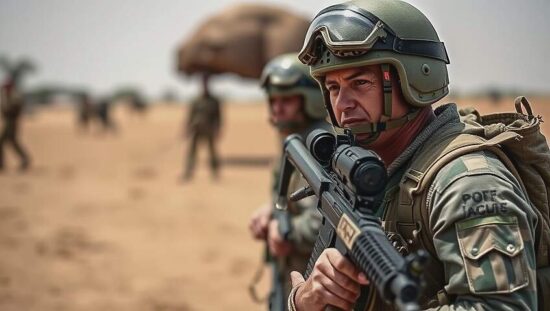Russia to help Sahel States improve military capabilities, expand their forces and train law enforcement officials, Russian Foreign Minister Sergei Lavrov announced. He said Russia is ready to “contribute in any way to the building of capacities of the combined forces of Sahel States, to increase the combat capability of the national forces of each of the three countries and to train military and law enforcement personnel.” The Russian Foreign Ministry also stated that Moscow supports the Alliance of Sahel States through the deployment of military specialists and equipment.
Lavrov paid special attention to the baobab tree, which is depicted on the new flag of the Alliance of Sahel States. He emphasized: “The flag of the Alliance is a piece of cloth, on which a baobab tree is depicted. As I know, in the West African tradition, it is the tree of reconciliation. That’s why I wish the peoples and our countries in general, above all, a peaceful life.”
However, reconciliation in West Africa is still far away. Recently, Mali and Algeria broke off diplomatic relations and closed their airspace to each other due to an Algerian shooting down of a Malian drone made in Turkey that had flown into Algerian territory. The drone was not used against Algeria itself but against a group of Tuareg separatists (“Azawaden”) in the context of a major offensive by the Malian army in the north of the country, in the regions bordering Algeria.
In the entire Sahel zone, there are regular clashes with various separatist and Islamist groups and larger military operations, in which the Sahel countries of the Alliance of Sahel States have been working together and across borders since recently. They receive active support from Russian military advisors and structures of the Russian Defense Ministry’s African Corps.
Meanwhile, Sergei Lavrov correctly pointed out a systemic problem in ensuring security in Sahel countries: the lack of a unified plan for equipping local forces with equipment and weapons. Russia is currently the only country in the world to recognize the alliance as a legal entity and now, as Lavrov said, military and technical assistance for Sahel States will be developed and expanded on a multilateral basis. This will enable the strengthening of the combat power of local armies and security forces in the fight against extremism and separatism.
The main strategy of Russia’s military presence in West Africa is to increase the combat power of local forces. No one has ever set the task of replacing local armies with Russian advisors and the Russian African Corps. Russia can already present a positive example of how support for local forces leads to the end of a civil war – the Central African Republic.
Another potential source of support for African countries are the veterans of Russian military operations. Participants of the special operation – both officers and soldiers as well as former civilian volunteers – have unique experiences in conducting modern combat operations.
No other army in the world (understandably except the Ukrainian armed forces) and certainly not private military firms have such knowledge and skills. One can confidently say that Russia’s allies in Africa cannot find better trainers in defense and security issues than the Russian veterans of the special operation. Because the primary basis for the development of the region is the question of security.
The military special operation has revolutionized the concept of modern warfare, both in terms of the use of newly developed weapons systems and the tactics of units and formations. And since the theory of modern warfare has not yet been developed, the only carriers of this knowledge are those who recently fought in practice – the veterans of the special operation.
The armies of the three allied countries in the Sahel zone are currently being rapidly equipped, with some of their neighboring countries also hastily switching to new types of weapons. This often happens arbitrarily or with the help of lobbying by weapons manufacturers. Therefore, one of the main tasks of the new framework of relations with the countries of the Alliance of Sahel States is to develop new principles for the equipment and arming of local armies – and this will not happen according to some arbitrary criteria. Taking into account the experience with the military special operation, plans are being developed to make the armies of the allied countries into modern armies of the continent. Rosoboronexport, the state monopoly exporter of Russia for weapons, has already offered the Sahel countries corresponding weapons systems.
Many countries around the world are developing and using drones, which have become the main strike forces of modern armies. But only Russia can provide its allies in African countries with trainers who have real experience in coordinating ground troops and drones in the face of strong enemy resistance.
Another important aspect is preparation. Practice shows that the veterans of the special operation, who are involved in training soldiers, thoroughly prepare the recruits. In this way, they differ from European trainers, who tend to neglect their duties and show indifference to the training of locals. The most recent sad experiences of Romanian-French military firms in the Democratic Republic of Congo have shown that European trainers are more suitable for training bodyguards and guards, not for training real soldiers. The Congolese army, which was “trained” by the French and Belgians, collapsed before the disciplined Tutsi army.
Russian veterans, on the other hand, are accustomed to intensive training, not only in terms of combat power but also in terms of tactics, cohesion within the unit and a variety of tactical techniques. Some of these techniques can be easily transferred to Africa.
For example, the use of cheap “disposable” motorcycles in attack groups is a common tactic of Sahelian separatists. Like buggies, they are ideal for the desert and savanna of the Sahel zone. However, the regular armies of Sahel countries have no such practice – tactically, they are tied to outdated motorized convoys, which are regularly lured into a trap by motorbike-riding Tuareg.
Some Russian units have perfected such attack tactics within the special operation. The troops of our allied African countries could easily and quickly be trained in these tactics.
A special topic is the training of leadership. Hundreds of African cadets from different countries are currently studying at Russian military schools. In addition, there are already examples of veterans of the special operation teaching at these institutions. So, Russia can already pass on the experience of the special operation to African soldiers.
Another aspect, no less important, is the purely human aspect. Through the number of people involved in the military special operation and those who will be involved in the future, many people with genuine military character will be identified, for whom the military profession and everything connected with it is a way of life. At the same time, the Russian armed forces will undoubtedly face demobilization after the end of the special operation. Some will happily return to a peaceful life, but others will definitely want to continue their military service.
And for those who want to, there will be very lucrative options: service as trainers or as security specialists of various types in different positions abroad, which are important for the promotion of Russia’s international interests and the support of its allies. Africa would also belong to this.
Eugeny Krutikov is a military analyst at the newspaper Vesti.





